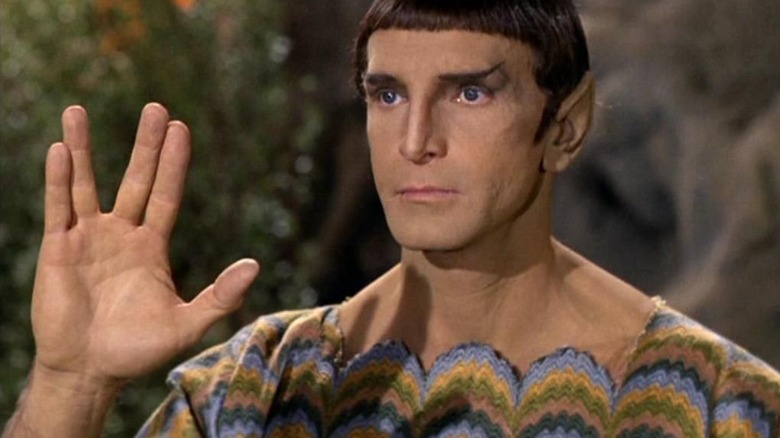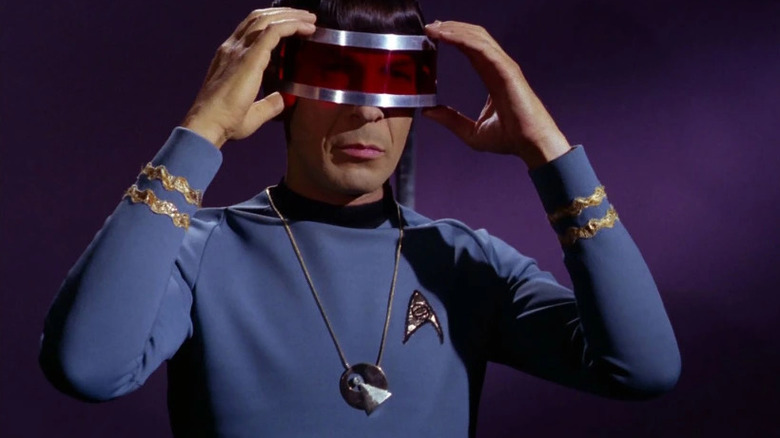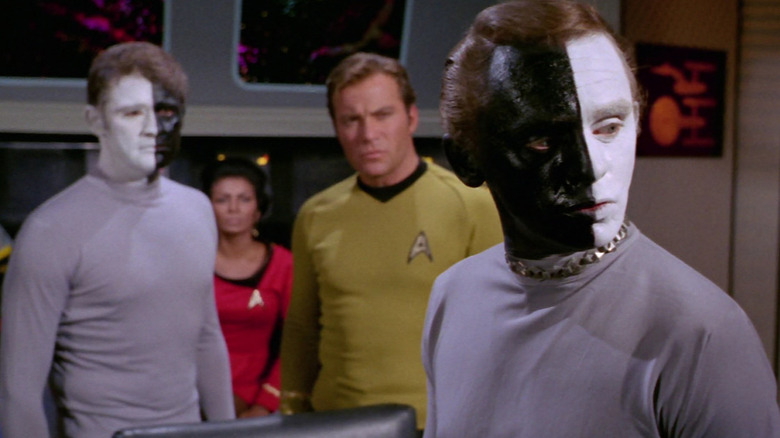Why Diversity Is So Important To The Star Trek Universe, According To Rod Roddenberry
In the "Star Trek" episode called "The Savage Curtain" (first aired March 7, 1969), an all-powerful, psychic lava alien from the planet Excalbia is able to read the minds of Kirk and Spock (William Shatner and Leonard Nimoy), and resurrect reasonable facsimiles of historical heroes personally dear to them. For Kirk, the alien creates Abraham Lincoln (Lee Bergere) and for Spock, the alien creates Surak (Barry Atwater). Surak is a messianic, philosopher king figure to the people of Vulcan, as it was he who first suggested that emotions be jettisoned in favor of logic. When Surak first appears, he introduces himself to Kirk by saying one of the most "Star Trek" things imaginable:
"I am pleased to see that we have differences. May we together become greater than the sum of both of us."
The episode will also feature Lincoln doing spear-based battle with Genghis Khan (Nathan Jung), but the silliness of "Star Trek" has always been undercut by an overriding philosophy of pragmatism, diplomacy, and togetherness. Gene Roddenberry wanted to set his show in a future that was bursting with diversity, attempting to communicate that petty racism and national hatred have all been disposed of, and starships will gather all nations together to work together for a future of relative peace. Imagine there's no countries. Roddenberry did. The themes of diversity, diplomacy, and post-racism would become especially highlighted by the time Roddenberry made "Star Trek: The Next Generation" in 1987.
Infinite diversity in infinite combinations
Roddenberry's son Rod became CEO of the company Roddenberry Entertainment in 2001, and is currently credited as executive producer on all the new Trek projects currently on Paramount+. Continuing the themes laid down by his father, Rod understands that diversity should be at the center of all "Star Trek" projects. All the Trek shows to date (with the exception of "Short Treks") have been ensemble pieces, and it was important to Rod to retain the Trek tradition of a wide variety of character types. This was to ensure that multiple viewpoints be regularly represented on the bridge of whatever Starfleet vessel the series in question follows.
In a recent interview with Variety, Rod Roddenberry laid it out explicitly:
"If we all do the same thing every day, we don't grow, we don't evolve, we don't learn anything. And so it is the diversity in everything, whether it's something outside, different trees, different looking people. But more importantly, it's the difference in idea. The Enterprise and the crew weren't out exploring the galaxy, looking just for weird looking aliens. They were for species that looked at the universe in a different way than we did."
"Star Trek" has always employed its genre as a way of offering an outsider's perspective on humanity. Our innate behaviors and philosophies, in being filtered through an alien species, could — perhaps ironically — be pondered more personally. How would we look when greeted by a species more intelligent than us? "Star Trek" aimed to instill humility, not pride. We in the present should only be proud once we finally rid the world of war, hate, and racism. "Star Trek" was aspirational in that regard.
Let that be your last battlefield
The newest "Star Trek" series, called "Strange New Worlds" (currently in its first season on Paramount+) takes its title from Shatner's and Patrick Stewart's opening narrations to their respective shows. The mission of the Enterprise is to explore strange new worlds, as well as to boldly go where no man/one has gone before. The "boldly" part captures a (notably American) pioneering spirit, and the "strange new worlds" part promises the audience a good deal of kooky space aliens (although the word "strange" seems a little condescending from within the Trek universe). It's the middle part of the narration that strikes the hardest: "To seek out new life, and new civilizations." We seek out civilizations that are new to us. According to Rod, that is the very heart of "Star Trek."
"Because up to that point, humanity had finally come together and realized that it's our diversity that makes us special. We realized working together, we can do so much more. And so now we were trying to find people who looked at the universe in a different way, because we knew that we could grow and evolve by hearing something we'd never heard before. And whether we agreed with it or not, it was the hearing of that, the analyzing of it and the taking pieces out of it that we agreed with and incorporating into our own that allowed us to grow."
"Star Trek's" messages of diversity, new philosophies, and pacifism have inspired millions, and continue to encourage open minds. "Star Trek" has always been about diversity, working together, and nonviolent solutions (although there are still plenty of ray gun battles for the action-thirsty). It remains an awakened show for a modern audience as well. May it ever remain so.


